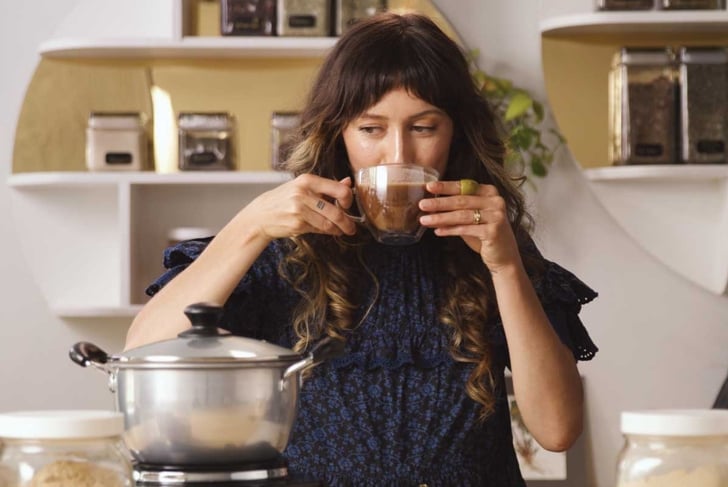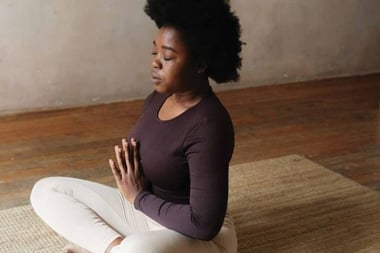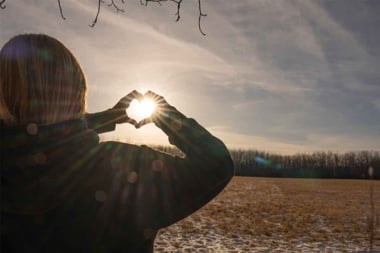
Rachelle Robinett, registered herbalist (RH), has a unique approach to wellness—one that embraces simplicity and connection to the body and nature. Drawing on her background in fashion and marketing, she’s proving that herbalism is just as relevant, hip, and sophisticated as any trending health practice.
While Robinett says a lot of people think of herbalism as crunchy or witchy, she hopes to “cleanse some palettes” and show people how to look at it from a different angle. Her goal is to make herbalism accessible and practical, guiding people toward a more intuitive, balanced relationship with their health through everyday rituals and natural remedies.
Everyday herbalism
“Most people consider herbalism as ‘plants as medicine’, and it is in part, but herbalism is about entirely holistic personalized natural health,” says Robinett. While the internet is inundated with overcomplicated wellness trends, Robinett says more mindful, grounded practices are where it’s at—and that most of us are already dabbling in herbalism, even if we don’t realize it.
How? Think about it: do you drink tea or coffee? Do you enjoy getting outside and feeling the grass on your toes, or working in your garden? What about cooking with fresh and dried herbs, or using essential oils? If so, these are all ways you’re interacting with herbalism every day.
Herbal starter pack
New to herbs? Rachelle Robinett, RH, recommends any of these to start exploring:
- prepackaged herbal teas
- loose herbs for making your own teas or essential oils
- pre-made capsules with herb combinations
- herbal coffees and alcohol alternatives
- nervines (nervous system herbs) such as lavender, rose, chamomile, lemon balm, and valerian
- nootropics (for memory, focus) like rosemary or ginkgo
- functional mushrooms for immune support
Weaving herbs into your routine
If you’ve been practicing herbalism without realizing it, you might be wondering how to do so more mindfully. According to Robinett, the key lies in shifting your mindset.
“The more we can be thinking about root causes, the better,” says Robinett, adding that it’s essential to get away from the mindset of “I have a symptom; I want to medicate the symptom.”
If you have a headache and you think, “What’s the herb for my headache?” Robinett says that’s half of a step in the right direction—the whole step would be asking: “’What is the cause of my headache? and How can I treat the cause naturally?’’ If we're never going to that cause level, it's just band-aids, band-aids, band-aids.”
A simple skincare boost
Looking to elevate your skin care routine naturally? Studies have shown that supplementing with hydrolyzed collagen can significantly improve skin hydration and elasticity, making it a simple skincare powerhouse to incorporate into your wellness routine.
Overwhelmed by wellness culture?
For those feeling overwhelmed by wellness culture, Robinett says she gets it. Her advice? “Ignore it all and reflect inward instead.” Instead of chasing every trend on Instagram or TikTok, she encourages turning to herbs as a personalized way to support your well-being.
“To many, many people, herbalism is brand new,” says Robinett, acknowledging that anything unfamiliar, especially something lacking mainstream marketing, can lead to hesitation.
She hopes her new book, Naturally: The Herbalist’s Guide to Health and Transformation, will help break down these barriers. She’s especially excited for people to learn natural solutions for their imbalances and how to use herbs in their daily lives. To help with this, the book includes a handy table that explains the best ways to use the herbs mentioned throughout the book.
“This approach to health is personal, it's holistic, and it long predates—and I'm positive will outlast—anything that's faddish or trendy now,” says Robinett. “It's really about restoring balance to our own lives’ vitality.”
Herbs for cold and flu season
When considering ways to incorporate herbalism into your daily life, learning which herbs can help you through cold and flu season may be at the top of your list. Here are four herbs to keep on hand throughout the fall, winter, and spring:
Garlic is well known for its anti-viral properties. Use it fresh, dried, in oils, or as a tincture.
Oil of oregano is widely recognized for its antiviral properties. It comes in tinctures, capsules, and as an essential oil.
Ginger may help reduce the risk of viral infections. You can find ginger fresh, powdered, in oil, and in juice.
Lemon balm has been shown to help fight certain flu strains. You can take it as a tea, tincture, dried, or in capsule form.
This article was originally published in the November/December 2025 issue of alive magazine (US edition).





